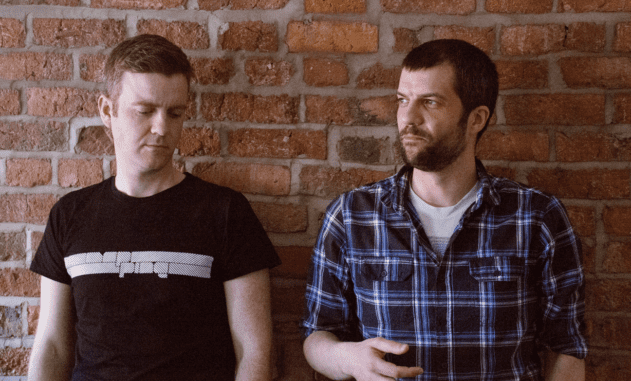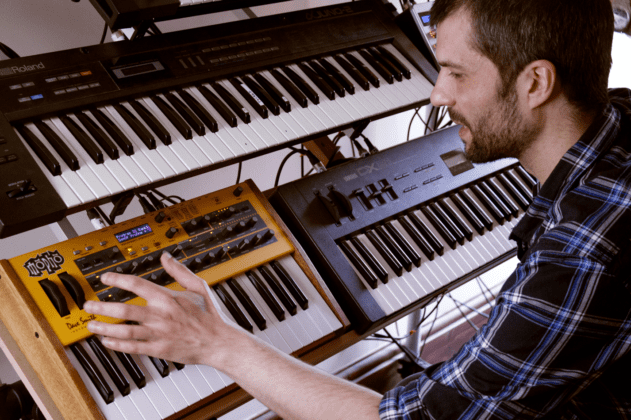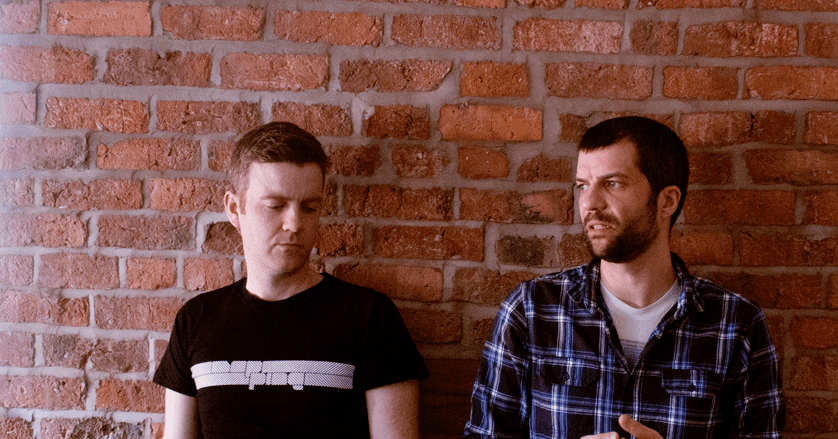Attack joins the Boys Noize Records duo in the studio to discuss why they didn’t want to be associated with electro, the significance of techno’s obsession with the future and how dance music producers should try to break the rules.

Shadow Dancer: Al Farrier (left) and Paul Farrier
Since their first Boys Noize Records release in 2007, brothers Paul and Al Farrier have released a string of EPs and 2009’s Golden Traxe album, the full-length distillation of (at least some of) their many influences. If you’ve heard their mixtape for Attack, you’ll probably already know that the Farriers are scholars of electronic music, with a near-encyclopaedic knowledge of everything from early 80s electropop to UK garage.
In advance of our visit to Al’s Manchester home studio, Paul warned us that the pair weren’t trained producers or engineers. The humility may be sincere but don’t let it fool you into thinking they don’t know what they’re doing; Paul, 36, and Al, 35, have been making electronic music together since childhood and their understanding of dance music production is practically innate.
We don’t have enough space for Paul’s thoughts on new genre names (“Post-dubstep? Fuck off!“) or some seriously geeky musings on the relative MIDI timing accuracy of Macs versus Ataris, but over the course of our interview Paul and Al offered insight into everything from what modern producers can learn from Detroit techno innovators through to the importance of having confidence in your own abilities.
Attack: Let’s start by talking about your association with the electro-house scene which was so huge a few years ago. A lot of people probably think of you as an electro act, but I don’t think that’s a very accurate pigeonhole to put you in.
Paul: We never really intended to be associated with what became known as the electro scene, partly because electro to us meant Street Sounds compilations… When we first started releasing records we probably tried to pander to what we thought was expected of us, so we played a lot more of that big electro stuff.

The pair use AKG K271 mkII studio headphones rather than monitors in order to avoid disturbing the neighbours.
Al: Particularly when we knew the first EP was coming out on Boys Noize, the sets had a lot of Boys Noize and Ed Banger Records tracks.
Paul: I think we lost a bit of our personality there. We probably thought it wouldn’t cut it to play a classic acid house track or classic techno.
So there was a bit of a misconception about who Shadow Dancer were from the very beginning. Did the association with Boys Noize Records make that perception slightly inevitable?
Paul: I know Alex himself consciously wanted the label to lose that association and be more diverse two or three years ago. There are still certain areas of electronic music – more serious parts – where they don’t really look at us twice. We tend to get ignored by Resident Advisor and people like that. I think they just expect us to make noisy electro shit…
The big question, then, is how you’d define yourselves. Which genre should your records be filed under?
Al: Recently I’ve just been saying techno, especially with certain classic sounds that have come back into our tracks from the hardware we’ve been using.
Paul: Nowadays people think techno just means one thing, but the original ethos behind it was very open-minded. It was more about that freedom and it was quite a diverse genre. Carl Craig records don’t sound like ‘Strings of Life’…
And there are techno classics which could just as easily be called house.
Paul: Yeah, like Inner City.
Exactly.
Paul: I like the idea that techno was a manifesto for making music. It wasn’t a sound, but it was about the influences that went with it and basically trying to make funk music that was by machines. Music that had emotion to it like machines had emotions.
It does have a kind of political message because it’s from a part of America that capitalism basically destroyed, abandoned and left for dead, but the majority of Detroit techno is about futurism and space. It’s odd that music which was predominantly about futurism is now retro.
People now seem to think that techno means something far more minimal, that it’s always got to be 128bpm, got to have big breakdowns and risers…
Al: You didn’t answer the question, though. What genre would you say we are?
Paul: I’d prefer to be called techno, but only in the traditional sense, not the modern one. People should try to understand what techno means. I think it’s really strange when people don’t know the history of the music they’re making.
So why did it take so long for you to start releasing music? You were making music since you were teenagers but it wasn’t until you were in your late twenties that you began releasing records.
Al: We were making music but we never really sent demos off to people. I think we maybe sent two or three off and never heard back, so we just thought it wasn’t good enough.
Paul: We chose the wrong labels to send to, though. I don’t remember this, but Al said the other day that we sent one to Rephlex. They would never have put out our stuff.

The studio setup changes on a regular basis. Current keyboards include the DSI Mopho, Roland Alpha Juno 2 and Juno 106 and the Yamaha DX21.
Were you just sending them to the labels you liked?
Paul: Yeah, that was the problem. With the really small labels like Skam and Rephlex, all the stuff that they released was by their mates.
I suppose the internet made it a lot easier to make contact with labels. Is that what eventually happened with you? How did you first hook up with Alex and Boys Noize Records?
Paul: Yeah it was. He heard some tracks on MySpace. He used to look on MySpace for new music. I think he still looks on SoundCloud now. He got in touch and asked to do an EP, then eventually he asked if we wanted to do an album. We hadn’t really made the music with the aim of getting it released, but MySpace made it possible to put it out there. People like Simian Mobile Disco and Zombie Nation used to give feedback on those early tracks. It was nice to have that little confidence boost and think we were doing something right. I think we always lacked that confidence.
You’ve already released a couple of the older tracks, haven’t you?
Al: Yeah, ‘Machine Code’ on the Second City EP and ‘Lo Fighters’ on the Murder Room EP are about ten years old.
Paul: They were both done around the same time using the Amiga, the Akai S900, Korg MS2000 vocoder and a shitty ART multi-effect box that we had. It’s strange now that people can listen to them in a modern context.
It must show there was something good about the tracks all along.
Paul: That’s frustrating, though, because it means maybe we could have put them out years ago. We started doing those electro tracks around ’99 or 2000. There were all these techno tracks around which didn’t justify being seven minutes long, so we thought we’d make something a bit more verse/chorus/verse and the length of a pop song. Then electroclash came along and we were like, ‘We had that idea!’ I don’t know why we didn’t latch onto that at the time.
Al: I think we were a bit defeatist about the fact that we were outside the scene. Anyway, a lot of those tracks are going to come out on an album for Bad Life in the autumn. Everything on the album was made between 1997 and 2002.
Did you carry on making music between then and signing to Boys Noize?
Paul: We stopped making music in 2003 and just had a period where we didn’t do it. In 2006 we started messing around again on a laptop.
 What did you do during that period?
What did you do during that period?
Al: I did a PhD in Manchester, which was pretty much all-consuming. We still DJed but we drifted away from electronic music a bit.
Did you lose interest in techno at that time?
Paul: When techno got a bit too serious and up its own arse in the late 90s I’d already drifted towards vocal and deep house anyway, then I was a bit influenced by UK garage. I never really bought any but I worked in a warehouse and we’d always have Radio One on so you’d hear Artful Dodger, B15 Project, Architechs and people like that. I used to be fascinated by it.
We did a track once which was inspired by ‘Rewind’ and we’ve got a track called ‘Run From Deep’ which has got quite a skippy garagey hi-hat pattern inspired by ‘Sincere’ by MJ Cole. It’s named after something Mark Lawrenson said on TV during the 1998 World Cup, when it was being made.
Al: Hopefully that’ll get released at some point.

09.07 AM
Inspiring! especially the part where the speak about the old classics and the minimal gear that was used to produce them. The new producers should learn something about that. Keep it RAW!
10.12 PM
Great interview, guys have a big knowledge about techno music and it’s always a joy to read what they say. I love their music and can’t wait for the autumn compilation on Bad Life.
12.23 AM
Anyone know which audio interfaces are beneath the RME FF800?
02.57 PM
As far as we recall those are Behringer ADA8000s.
http://www.behringer.com/EN/Products/ADA8000.aspx
07.25 PM
Thank you! Much appreciated.